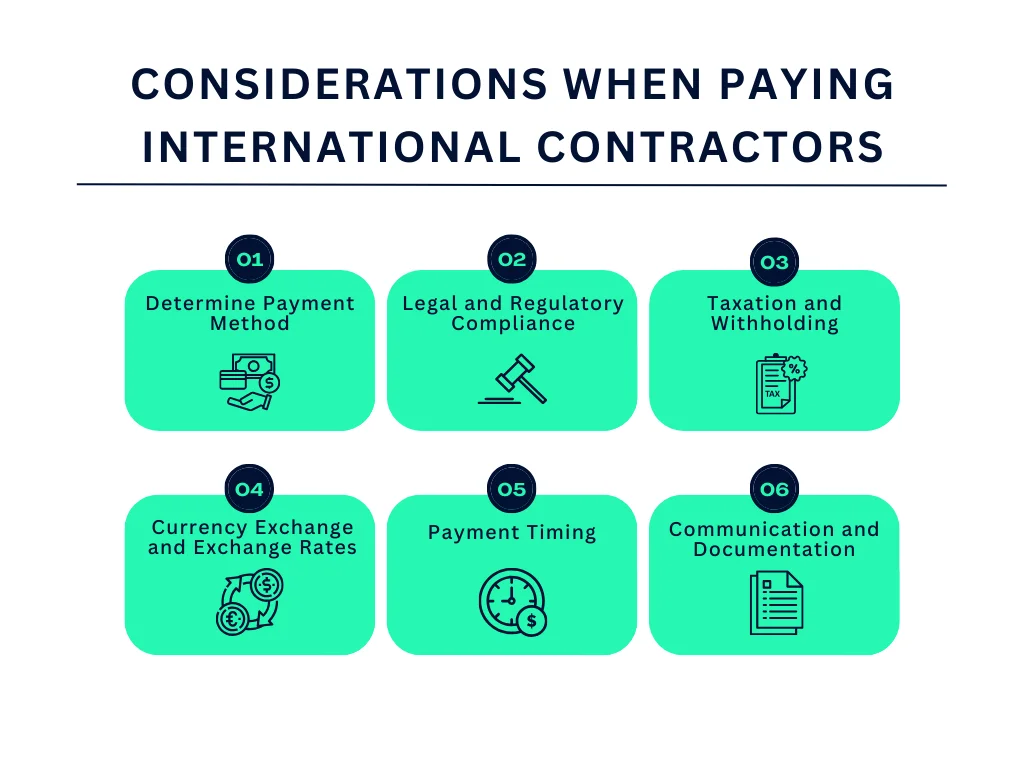Catena is now Pearl Talent! Same mission, new name.
In the ever-evolving global business landscape, it is vital to have a comprehensive understanding of international contractor payments. The complexity of navigating this aspect can pose challenges, particularly for startups and businesses aiming to expand their workforce beyond borders.
When managing international contractor payments, startups and businesses can rely on Pearl. As a trusted offshore EA placement service, they are dedicated to connecting businesses with exceptional talent from around the world. With their expertise, you can seamlessly navigate how you can pay international contractors.
In this blog post, we will guide you on how to pay international contractors to help streamline this critical facet of your business operations. We will discuss payment methods, legal and tax considerations, currency exchange, communication strategies, and documentation requirements. Whether you need to make monthly payments to international contractors or want to understand the amount you pay and the payment method used, we have all the details covered for you.
Don't let the challenges of international payments burden your business. Understanding how to pay international contractors to establish strong and successful working relationships with your global workforce is vital. Let's delve into this important topic together.
What are International Contractors

International contractors are experienced professionals or businesses located outside your country, providing their services remotely. They play a crucial role in the global business landscape by offering specialized expertise, cost-effective solutions, and flexibility. Many companies hire international contractors to access specific talents, expedite project completion, or mitigate labor expenses.
There are several advantages to hiring international contractors. One of the key benefits is the ability to access a diverse global talent pool, which can bring in various skills and perspectives. This diversity often leads to innovative solutions and enhances competitiveness. Furthermore, hiring international contractors can also result in cost savings compared to hiring full-time employees since you only pay for the specific work that is needed.
Working with international contractors can pose challenges. Language barriers, time zone differences, and cultural nuances may impact communication and collaboration. Understanding and navigating international tax laws and payment methods can ensure a seamless and productive working relationship.
7 Steps on How to Pay International Contractors
Paying international contractors may seem complex, but it's crucial for businesses expanding globally. This guide will walk you through seven essential steps to ensure seamless international contractor payments. From payment methods to legal compliance, you'll gain valuable insights on how to pay international contractors.

Step 1: Establish Clear Payment Terms
To establish a successful payment process with international contractors, it is crucial to have clearly defined payment terms. Establishing a successful payment process is convenient and crucial to maintaining a productive and harmonious working relationship when dealing with international contractors. Here are some detailed points to consider when setting up these essential payment terms:
- Drafting a Comprehensive Independent Contractor Agreement: To start, create a comprehensive independent contractor agreement that both parties will sign. This agreement is a legally binding contract that establishes the structure for the entire working relationship.
- Define Payment Frequency: Be sure to specify the payment frequency in the agreement. Determine whether payments will be made monthly, bi-weekly, or on another schedule. This clarity ensures that both you and your contractor have a mutual understanding of when compensation can be expected.
- Specify Currency: When deciding the currency for payments, using your currency for simplicity might be appealing. However, it is often recommended to use the contractor's local currency. This makes the process more convenient for them and eliminates the challenges of dealing with fluctuating exchange rates.
- Agree Upon Payment Method: Define the preferred method of payment, whether it is wire transfers, PayPal, online payment platforms, or any other mutually agreed-upon option. Selecting a method that both parties find convenient and secure is crucial.
- Include Payment Experiences in Writing: Include all payment terms in the independent contractor agreement, documented in writing. This is a formal commitment and reference for both parties, ensuring clarity and providing a resolution framework for any potential disputes or misunderstandings.
Setting clear and comprehensive payment terms is vital for establishing a solid foundation in your international contractor relationship. This practice helps set expectations, reduce risks, and enable both parties to concentrate on their work without the distraction of financial uncertainties.
Step 2: Gather the Contractor's Payment Information
Once you have established the payment terms, gathering the necessary payment information from your international contractor is essential. This typically includes their banking details, such as the account number, routing number, and bank name. Ensuring accuracy is crucial in this step. Even a minor error in an account number can result in payment delays and unnecessary complications.
It's also worth discussing alternative payment methods based on the contractor's preferences. Some contractors may find PayPal more convenient, while others prefer traditional wire transfers or even cryptocurrencies. Multiple options can cater to your contractor's needs and make the payment process more efficient.
Step 3: Comply with Local Laws and Tax Obligations
When you pay international contractors, navigating the intricate waters of international tax laws is crucial. It's essential to thoroughly understand and adhere to both your country's tax regulations and the contractor's home country's tax laws. Failing to comply can result in legal trouble and financial penalties.
Different arrangements and countries may require you to withhold taxes or complete specific forms, like the W-8BEN-E or IRS Form W-8BEN. It's advisable to seek guidance from a tax expert or legal advisor to comply with all required tax obligations and avoid any unexpected issues.
Step 4: Calculate the Amount to Pay
Determining the appropriate payment for international contractors can be a complex undertaking, given the constant fluctuations in exchange rates and use of different currencies. To minimize any potential disagreements or inconsistencies, it is crucial to establish the methodology for calculating payment amounts in your independent contractor agreement.
To ensure clarity and avoid misunderstandings or disputes, it is advisable to rely on trustworthy online currency conversion tools or consult your financial institution for accurate exchange rates. This will help establish a common understanding between you and your contractor regarding the payment amount.
Step 5: Choose the Payment Method
Choosing the appropriate payment method is a crucial decision. While wire transfers and PayPal are commonly used options, the digital era has introduced alternatives such as cryptocurrencies and digital wallets. Each payment method has pros and cons, so it's essential to select the one that best suits your contractor's preferences and minimizes transaction fees.
Take PayPal, for example. It's widely recognized for its convenience and acceptance across various platforms. On the other hand, cryptocurrencies provide quicker transactions and potentially lower fees. Nevertheless, remember that transaction fees may be associated with your chosen method, which could impact contractors' earnings.
Step 6: Make Timely Payments
Timely manner is crucial when you pay international contractors. It shows professionalism and reliability, which are essential for maintaining a healthy working relationship.
To avoid missing payment deadlines and potential consequences like additional fees or penalties, it's helpful to set up payment reminders or automate your payments. This prevents strain on your relationship with the contractor and ensures timely payments according to your agreement.
Step 7: Keep Records and Communication Open
It's essential to prioritize clear communication and maintain accurate records. Make sure to document every payment made, including the date, amount, and method of payment. Additionally, keeping a record of any communication related to payments can be beneficial in disputes or inquiries since it provides clarity and resolves potential issues more efficiently.
Building trust and reliability in a business relationship with your international contractor requires transparency. Both parties should have confidence in a fair and well-documented payment process. This not only promotes accountability but also fosters trust in the working relationship.
Considerations When Paying International Contractors
Expanding global reach, accessing specialized talent pools, and streamlining operations are some reasons why businesses consider hiring international contractors. However, understanding how to efficiently and compliantly pay international contractors is essential before tapping into their potential. This guide will provide valuable insights on considerations when you pay international contractors, including payment methods and legal requirements.

Determine Payment Method
When you pay international contractors, the first thing to consider is choosing a suitable payment method. You have several options, including wire transfers, online payment platforms, and checks.
- Wire Transfers: One standard method is wire transfers. They're fast and reliable, but remember that they often come with transaction fees and exchange rate fluctuations.
- Online Payment Platforms: Platforms like PayPal and Xoom provide convenience and flexibility. However, be aware of their transaction fees.
- Checks: Traditional checks can be used, but they may be less efficient and take longer to reach international contractors.
Consider each method's pros and cons, such as transaction fees and exchange rate stability. Additionally, be mindful of currency exchange considerations, as fluctuations can impact the final amount your international contractors receive.
Legal and Regulatory Compliance
You must navigate legal and regulatory compliance requirements to pay international contractors successfully. Here's what you need to know:
- Legal Obligations: Understand the laws governing international contractor payments in your country and the contractor's country. Compliance with both sets of regulations is essential.
- Tax Implications: Familiarize yourself with the tax implications of international payments. Different countries may have withholding tax requirements that apply to payments made to foreign contractors.
- Documentation: Proper documentation, including contracts and agreements, is crucial. Ensure that your contracts clearly outline payment terms, taxes, and other relevant details.
Taxation and Withholding
International contractor payments often involve taxation and withholding. Here's how to navigate this complex aspect:
- Tax Application: Explain to contractors how taxes are applied to international contractor payments, considering both your country's tax laws and those of the contractor's country.
- Withholding Requirements: Discuss withholding requirements and any applicable tax treaties between countries. This will ensure compliance with tax laws and minimize tax-related issues.
- Guidance: Offer guidance on handling tax-related matters, such as filling out IRS Form W-8BEN-E for U.S. tax purposes. Ensure that both parties understand their tax obligations.
Currency Exchange and Exchange Rates
Currency exchange plays a significant role in international contractor payments. Here's what you need to consider:
- Exchange Impact: Explain to contractors how currency exchange can impact payments. Fluctuations in exchange rates can affect the final amount received by international contractors.
- Risk Mitigation: Providing strategies to mitigate currency exchange risks is helpful. For instance, forward contracts or options can help lock in exchange rates.
- Monitoring Tools: Recommend tools and resources for monitoring exchange rates. This ensures that you make payments at advantageous rates.
Payment Timing
Timing is critical when you pay international contractors. Consider these factors:
- Significance: Payment timing is crucial for international contractors. Timely payments maintain a positive working relationship and trust.
- Scheduling Tips: Offer tips on setting up a payment schedule. Consider monthly or milestone-based payments to align with project progress.
- Milestone Payments: Explain the concept of milestone-based payments, where contractors receive payments upon completing specific project phases. This can provide added motivation and accountability.
Communication and Documentation
Effective communication and proper documentation are the keys to successful international contractor payments:
- Clear Communication: Clear and transparent communication with international contractors is crucial. Discussing payment terms, expectations, and any potential issues upfront is essential.
- Documentation: Documenting payment processing, including invoices and receipts, is essential. Provide templates for these documents to streamline the process.
Conclusion
To establish a smooth and productive collaboration with your overseas workforce, you must have a comprehensive understanding of the requirements, amounts, and methods involved when you pay international contractors—ensuring compliance with international employment laws and tax regulations and exploring various payment options such as bank transfers, digital wallets, or cryptocurrencies like Bitcoin becomes crucial for seamless operations.
We encourage you to put the insights from this guide into practice when managing international contractor payments. By doing so, you can ensure the satisfaction and trust of your global workforce while enhancing your business's reputation on the international stage.
If you need personalized guidance and assistance on how to pay international contractors, look no further than Pearl. Our expertise lies in international contractor management, and we offer tailored insights to address your specific requirements. Schedule a consultation with us today and confidently navigate the complexities of international contractor payments.
Businesses with global aspirations must understand how to pay international contractors. By adopting these insights and strategies, you can effectively handle payments to international contractors, setting the stage for continued growth and success in your business.
Frequently Asked Questions
Originally Published
September 21, 2023




.svg)


















